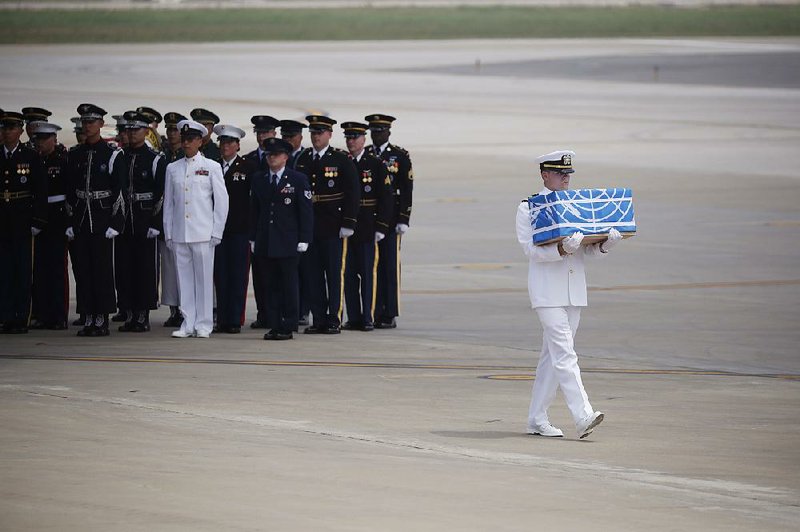PYEONGTAEK, South Korea -- Remains believed to be those of about 50 U.S. servicemen were flown out of North Korea today, the first visible result of President Donald Trump's efforts to bring the U.S. war dead home 65 years after the end of the Korean War.
"We are encouraged by North Korea's actions and the momentum for positive change," the White House said in announcing the handover.
A U.S. Air Force C-17 transport aircraft carrying the remains landed at Osan Air Base south of Seoul, the South Korean capital.
From Osan Air Base, the remains will be transferred to the Defense POW/MIA Accounting Agency in Hawaii, where painstaking forensic work will be carried out to identify them. Remains that were returned in the past from North Korea were found to have been mixed with those of unidentified people and even with animal bones.
The Korean War was halted with an armistice signed 65 years ago today. But thousands of U.S. troops killed in major battles in North Korea have not been returned because the war was never formally concluded with a peace treaty and because North Korea and the United States lack diplomatic ties.
The remains flown out today were the first handed over since 2007 when Bill Richardson, a former U.N. ambassador and New Mexico governor, went to North Korea on a private mission and secured six sets of remains. Between 1996 and 2005, a joint group of U.S. military experts and North Korean workers collected the remains of what were believed to have been 220 U.S. soldiers.
[NUCLEAR NORTH KOREA: Maps, data on country’s nuclear program]
But since then, efforts to bring the war dead home have been overshadowed by tensions over the North's nuclear weapons program.
A breakthrough came when Trump held a summit meeting with North Korea's leader, Kim Jong Un, in Singapore on June 12. Kim committed to work toward the denuclearization of the Korean Peninsula and promised to return the remains of U.S. troops, starting with those already recovered and identified.
Trump claimed last month that the North Koreans had "already sent back, or are in the process of sending back, the remains of our great heroes." He also boasted that North Korea's nuclear crisis had been "largely solved." But the efforts to denuclearize North Korea and return the U.S. remains have moved slower than Washington had hoped.
Secretary of State Mike Pompeo visited Pyongyang, the North Korean capital, this month to urge North Korea to go forward with Kim's commitments. North Korea soon accused the United States of making a "unilateral and gangster-like demand for denuclearization" while failing to offer corresponding U.S. incentives to improve ties.
North Korea and the United States have yet to agree on a detailed road map on how to achieve what Kim and Trump both identified as their common goal: the "complete denuclearization of the Korean Peninsula" and the creation of a new bilateral relationship.
Still, during recent talks with U.S. officials, the North reaffirmed its commitment to return some remains. Its officials also agreed to resume joint U.S.-North Korean searches at major battle sites in the North to recover more remains.
A Section on 07/27/2018
